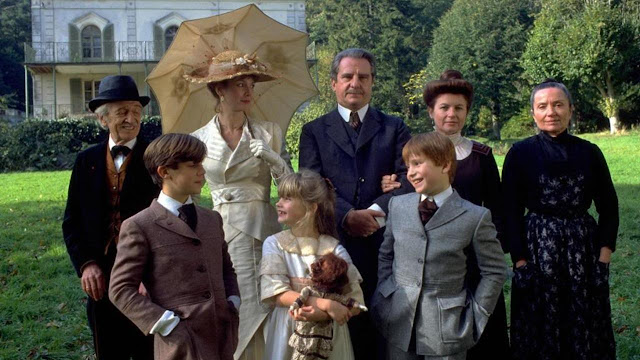Pastoral family politics
Tuesday, February 1, 2022
Ever imagine if Monet, Renoir, or another famous impressionistic painter were able to create a motion picture in their day? The end product might be something like A Sunday in the Country, a 1984 movie directed by Bertrand Tavernier that, while thin on story, is richly textured with sumptuous natural visuals and fascinating dialogue that reveals volumes about its characters while also leaving plenty to the imagination. Our merry band of CineVerse members took a leisurely stroll through this cinematic outing last week and came away impressed, as evidenced by the following recap of our conversation (to listen to a recording of our group discussion, click here).
What did you find fascinating, unexpected, notable, or fulfilling about A Sunday in the Country?
- The filmmaking style feels “painterly,” as if we are watching a cinematic version of an impressionistic painting by a master artist. Interestingly, Ladmiral is a painter who deviated from the impressionists of his era, choosing instead to follow a traditionalist style.
- The scene toward the end where Irene and her father visit the outdoor café and dance, with its movement of characters, array of colors, and cheerful spirit, is perhaps the closest this movie comes to an impressionistic painting.
- There is no major plot. We simply observe an old man and his children and grandchildren on one day in the summer of 1912. Instead of a traditional narrative with rising and falling action, conflicts and resolution, and a conventional three-act structure, we are shown slice-of-life vignettes within a condensed time frame that “paint a picture,” impressionistically, of three generations of a family.
- Roger Ebert wrote: “Tavernier never urges his story upon us, and has no great plot to unwind. He simply wants to observe his characters during the course of a long day during which we find that none of them are very happy with their lives…To find comparable attention to the subtle forces within a family, you would have to turn to Yasujiro Ozu, who made almost all of his films about Japanese families. The Japanese term "mono no aware," which suggests a bittersweet awareness of the beauty of life and the inevitability of death, applies to Ozu, and here to Tavernier.”
- The film features sporadic voiceover narration by an unseen and mysterious third party, offering emotional navigation to the characters and providing commentary on what certain personalities are feeling or thinking.
- We are shown several dream-like interludes that apparently are memories, fantasies, or thoughts a character is having but which depict something not actually happening in reality: for example, Ladmiral’s son and daughter-in-law and his housekeeper observe his dead body in his bed; Irene envisions her deceased mother who says “Will you stop asking so much of life, Irene?”; and Irene has an unspoken thought that her niece will die prematurely at age 15.
Major themes
- Family politics, and the complexities of and undercurrents driving familial relationships.
- Ladrimal is disappointed in his son and makes this dissatisfaction clear in his words and attitude, even though Gonzague tries to please his father and visits him fairly regularly; but Ladrimal’s daughter Irene can do no wrong, even though her life is not settled, she is an impulsive free spirit, she rarely visits, and she questions her father’s artistic choices.
- Small, assumedly unimportant moments in a person’s life can make a major impact.
- Self-reflection, personal assessment, and taking stock of one’s life, talents, ambitions, and legacy.
- It’s never too late to reinvent yourself and make a change, and we can be suddenly inspired by unexpected forces that come into our lives and influence us to invoke new creativity.
- An anonymous writer on the blog Ripple Effects wrote: “For an old man, every goodbye could be the last. But the final scene appears to turn the tide. Ladmiral goes into his studio, takes down the painting he’s been working on, a still-life subject he’s painted numerous times before and in a style he’s been following all his life. He replaces it with a blank canvas on the easel, sits down, and looks at it ponderously. Like his son’s, his life, too, has been a disappointment to himself…What I see is a slight, nuanced smile on his face. Every blank canvas is a fresh start no matter how old you are.”
Similar works
- Films by Yasujiro Ozu, including Late Spring, Autumn Afternoon, Early Summer, and Late Autumn
- On Golden Pond
- The Farewell
- About Schmidt
- At Eternity’s Gate
- Bienvenue parmi nous
- The Ballad of Narayama
Other films by Bertrand Tavernier
- The Clockmaker
- Round Midnight
- Daddy Nostalgia
- The Princess of Montpensier
- It All Starts Today




